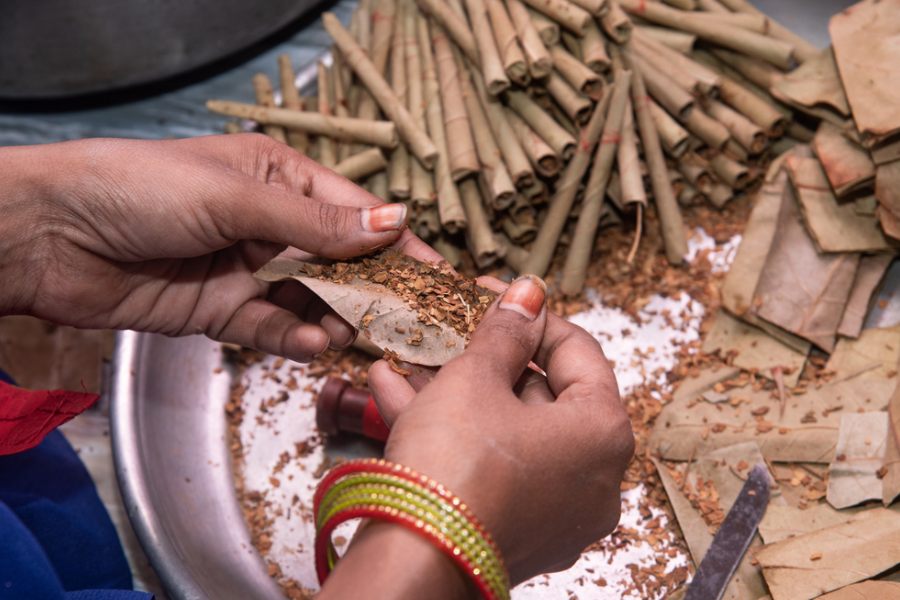The beedi industry in West Bengal, which has for decades been a steady source of employment and financial independence for women, is facing an uncertain future. The state is currently home to the highest concentration of beedi workers in India, with over 1.8 million individuals relying on this industry for their livelihood.
Beedi rolling, the core activity of this sector, provides crucial income to a significant portion of West Bengal’s population, primarily those residing in rural areas and belonging to economically disadvantaged backgrounds. The industry’s troubles have grave implications on the well-being and future prospects of its sizable workforce.
98 per cent workers are women
Women form the backbone of the West Bengal beedi industry, constituting a staggering 98.35 per cent of the total workers. This dominance can be attributed to the home-based nature of beedi rolling, allowing women to manage household responsibilities while earning an income. The flexibility offered by this industry makes it an attractive option for women who often face limited employment opportunities due to social and cultural constraints. As one beedi worker from Murshidabad poignantly said during a recent focus-group discussion, “Beedi making is our life, like the need for water. We would be in a dire crisis without beedi rolling. It is our main source of survival.” This sentiment underscores the crucial role of the beedi industry in providing financial security and empowerment to women in West Bengal.

Beedi rolling has been a steady source of employement for rural women, allowing them to manage household responsibilities while earning an income Shutterstock
The low wages and lack of social security for workers, however, are causes for concern. The average monthly income for beedi rollers in West Bengal, according to a recent survey, is between Rs 2,100 and Rs 3,000, barely enough to meet basic needs. Moreover, a significant proportion of beedi workers lack formal recognition and access to welfare schemes, leaving them vulnerable to exploitation and financial instability.
GST blow
The impact of the GST on the beedi industry further complicates matters. The implementation of a 28 per cent GST on beedis has led to increased production costs and a reduction in worker wages. This situation has sparked calls for government intervention, including a reduction in the GST rate and the introduction of support measures for small-scale beedi producers to ensure fair compensation for workers.

The implementation of a 28 per cent GST on beedis has led to increased production costs and a reduction in worker wages TT Archives
Looking ahead, the future of the beedi industry hangs in the balance, caught between its role as a lifeline for millions and the need for improved working conditions and social security for its workforce. One proposed solution involves the revitalisation of traditional beedi making through innovation, quality improvements, and worker upskilling. This approach seeks to preserve the cultural significance of beedis while enhancing their market appeal, potentially leading to higher wages and a more sustainable industry.
Path to the future
The long-term viability of the beedi industry in West Bengal depends on addressing the concerns surrounding worker welfare and economic sustainability. Ensuring decent wages, providing access to social security benefits, and exploring avenues for industry modernisation are essential steps towards creating a more equitable and sustainable future for beedi workers and their families.

Increasing punishment for retailers scares them away from selling beedis, says a Pune-based beedi manufactoring company owner Shutterstock
As Bimal Desai, owner of Pune-headquartered Desai Brothers Limited, a prominent beedi manufacturing company operating in multiple locations, aptly states: “The decision to increase punishment for retailers scares them away from selling beedis, which in turn decreases the sale of beedis. A lot of women and their families will be affected by this decision. The governments have been promising us that the beedi workers will get their deserved benefits and will have their support, but nobody has seen any benefits yet, and those promises have not been met.” These concerns underscore the urgency of enacting meaningful reforms to protect and empower the millions who depend on the beedi industry for their livelihood.
